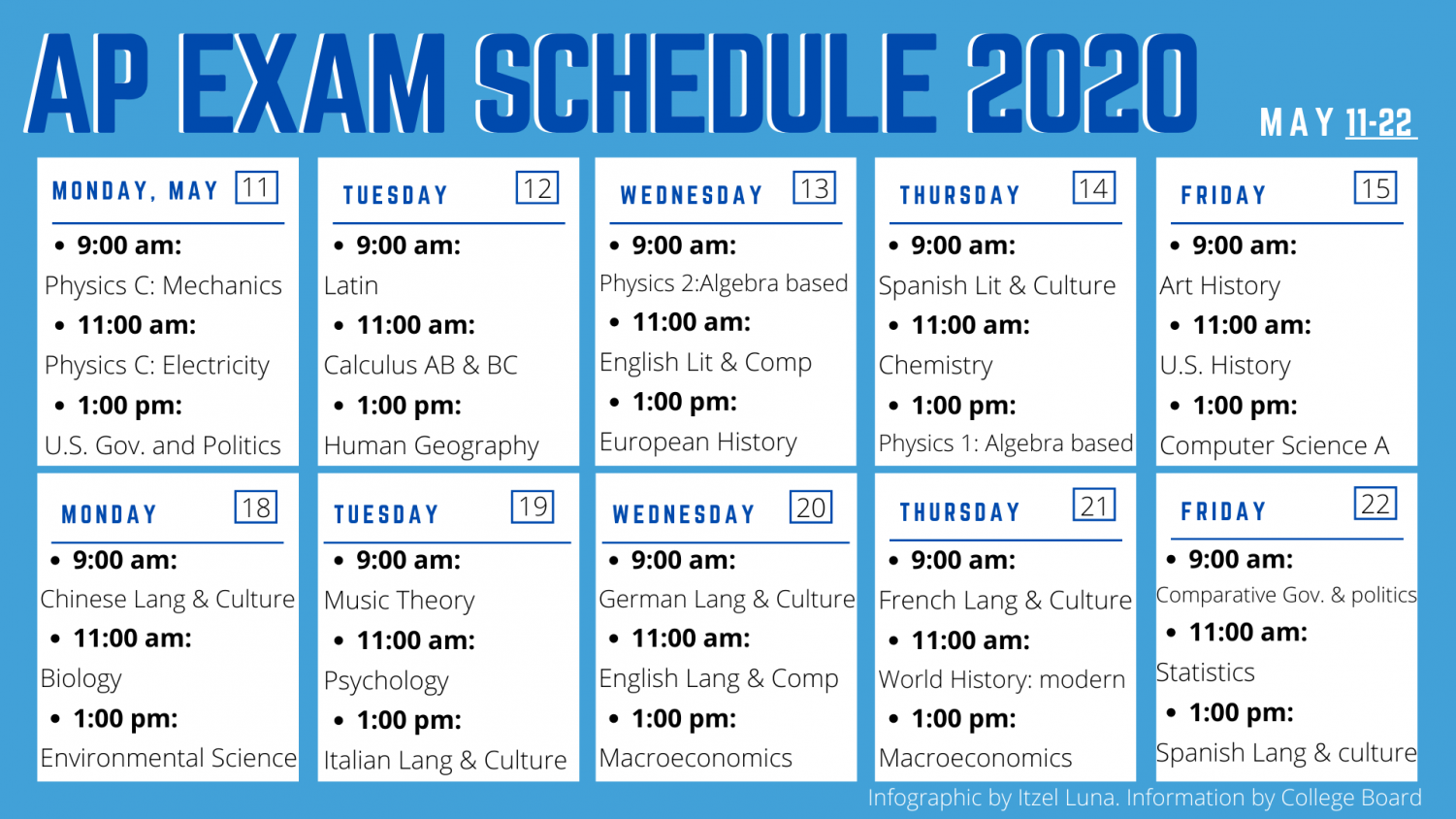Students prepare for new AP exam format
May 5, 2020

The Advanced Placement exams are scheduled to take place from May 11-22.
The College Board’s announcement about the online structures for this year’s Advanced Placement exams (AP) has caused frustration among students who wonder if they’re prepared enough for these exams.
“The thing I’m most worried about is not being prepared enough. All of the online classes, Zoom sessions, homework and then the extra work my teachers give is a lot,” said sophomore Chareena Pascua, who is taking the AP World History exam. “I’m worried that I won’t have time to not only physically prepare myself but mentally.”
When many schools across the U.S. began to close due to the massive spread of the COVID-19 pandemic, the College Board also began to ease their AP exams that were originally planned for students to take at school. They decided to test AP students only on the material they learned in the fall and winter.
Students will be taking these AP exams online through a computer, tablet or smartphone. This might sound like a nice testing experience, however, anything can happen with the internet connection and the house environment, being distracting or noisy for some students. As students switched to virtual learning, AP students began to wonder about their preparation for the exams.
“I’m most worried about the exams if my WiFi suddenly goes out. I know it hasn’t happened a lot but it’s still a possibility,” said junior Brenda Zaragoza, who is taking AP English Literature, AP U.S. History and the AP Spanish Language exam. “I’m also worried if I’ll be able to have that silence I need to concentrate. My siblings always forget whenever I’m on a Zoom meeting and I have a feeling they might disrupt me during the AP exams.”
About 82 students attending Daniel Pearl Magnet High School are in at least one AP class. As usual, students taking more than one AP exam will be taking their exams on different days. The AP Calculus AB (May 12), AP English Literature (May 13), AP U.S. History (May 15), AP English Language (May 20) and the AP World History (May 21) exam will begin at 11:00 am Pacific Time. The AP U.S. Government (May 11) and AP Spanish Language (May 22) exams will be at 1 pm, PST.
On March 25, the College Board began to film free review lessons on one of their YouTube channels, Advance Placement because they notice the challenges students face during this unexpected time.
“During this challenging time, we will work to give every AP student the opportunity to earn the college credit and placement they’ve been working toward all year while maintaining a focus on the health and safety of our AP community,” College Board’s Advanced Placement said in a tweet on March 20.
The College Board has also temporarily changed the format of most AP exams to make them less challenging since schools are closed and have to prepare at home without much help from their teachers. Most of these exams will be 45-minutes long, adding an extra 5 minutes to upload, and are open note/book. Students can take the exam online or handwrite it and submit a photo. Students will need to access the online testing system 30 minutes early to get set up.
Students taking the AP Spanish Language and Culture exam will complete two spoken tasks with three and four free-response questions on the current AP Exam. Written responses will not be required.
“I have mixed feelings about the structure of our AP exams because in some cases it makes things straightforward and gives us one thing to focus on, but in other cases, it becomes harder to rely on the easier sections of the exams,” senior Ivan Moreno said, taking the AP Calculus, AP English Language, and AP Government exam.
Even though students have to prepare at home, many have been studying and preparing with assignments teachers have given them and resources the internet and College Board provides them.
“I am looking at examples of good strategies and how people have written their exams in previous years, trying to sort of model after them,” said senior Tylin Jarret, taking the AP English Language exam.
Teachers also have been more challenging on students and assign more work to be sure that they are practicing and preparing for the exams. Some teachers also worry that students aren’t trying hard enough to prepare for the exams, as fewer students show up in their Zoom meetings.









